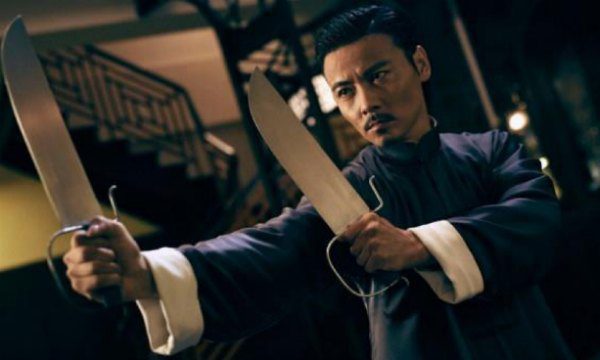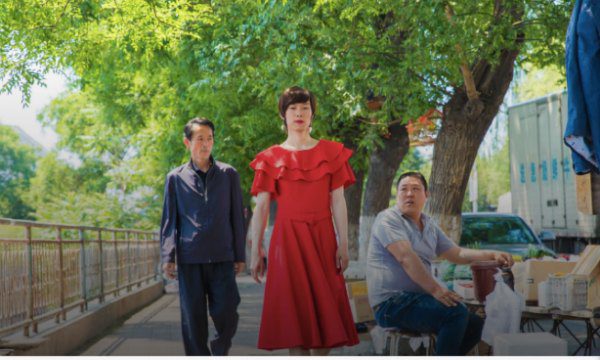China Arts & Entertainment
An Overview of Chinese Nominations at Busan Film Festival (Part II)
Three Chinese blockbusters & two films touching upon gender issues; these Chinese films at Busan are definitely worth watching.
Published
6 years agoon
By
Gabi Verberg
From Chinese dissident filmmakers to government-funded films, you can find it all at Busan, Asia’s biggest film festival. In the weeks leading up to the event, What’s on Weibo’s Gabi Verberg provides an overview of the Chinese nominees. This week: Part II (See Part I here).
On the 4th of October, the 23th Busan International Film Festival in South Korea will roll out its red carpet to open this year’s film festival season in Asia. With the screening of 323 films from 79 countries, it is one of Asia’s biggest international film festivals, with China as one of the main suppliers of films.
This week, we will introduce to you to the second batch of the Chinese nominees.
1. Master Z: The Ip Man Legacy (Yèwèn Wàizhuàn: Zhāngtiānzhì 叶问外传:张天志)

Mainland China/Hong Kong
Genre: Action
Selected in the category: Opening Night Film
Director: Woo-ping Yuen (袁和平)
Weibo Hashtag: #张天志# (19.600.000+ views)
Premiere: October 2018, Busan International Film Festival
Starring: Max Zhang (张晋), Dave Bautista (戴夫·巴蒂斯塔), Michelle Yeoh (杨紫琼), Tony Jaa (托尼·贾), Chrissie Chaw (周秀娜)
About the Director:
Woo-ping Yuen was born in 1945, making him the oldest nominated Chinese director at this years’ Busan Film Festival. In 1978, Woo-ping Yuen was recognized by the film industry for the first time for his works Snake in the Eagle’s Shadow (Shé xíng diāo shǒu 蛇形刁手) and Drunken Master (Zuì quán 醉拳).
With Jackie Chan starring as the male protagonist in Drunken Master, the film was nominated for the Golden Horse awards at the Taiwan International Film Festival. In the 40 years that followed, Woo-ping Yuan’s films received numerous nominations and awards at film festivals all over the world.
His most famous contributions to film are as the action director of Crouching Tiger, Hidden Dragon and Kill Bill: vol.2, and as a Kung-fu choreographer for the film The Matrix.
Storyline:
This spinoff focuses on Cheung Tin Chi (a pivotal character from Ip Man 3, played by Zhang), who has been defated by Ip Man and had his house burned down to the ground. He decides to seek shelter on Bar Street, where he quickly finds solace from his neighbors. But when Tin Chi discovers a gang is peddling drugs on Bar street, he takes it upon himself to intervene and gets into a fight with a powerful foreign villain.
Check out the trailer with English subtitles here.
Why you should watch it:
The main actors are internationally renowned. Michelle Yeoh showed off her beautiful martial arts skills in films such as Crouching Tiger, Hidden Dragon. Max Zhang’s showed his mastery of wushu in films such as The Grandmaster and Ip Man 3.
On their website, the organization of the Busan International Film Festival calls the film “dazzling, gripping, and an astonishingly action-driven film that will satisfy the audiences who are looking for great action scenes especially on a big screen.” They also call it one of the “most essential martial art films” that Hong Kong has ever seen.
2. The Island (Yīchū Hǎoxì 一出好戏)

China Mainland
Genre: Comedy, Drama
Selected in the category: : A Window on Asian Cinema
Director: Bo Huang (黄渤)
Premiere: 10th August 2018
Starring: Bo Huang (黄渤), Qi Shu (舒淇),Baoqiang Wang (王宝强),Yixing Zhang (张艺兴), Hewei Yu (于和伟), Xun Wang (王迅), Qinqin Li (李勤勤), You-lin Li (李又麟 ), Hao Ning (宁浩), Hu Guan (管虎), Jing Liang (梁静), Zheng Xu (徐峥), Teddy Chan (陈德森), Lei Zhang (张磊)
About the Director:
Bo Huang is one of China’s most famous comic actors. Except for acting, he is also a singer, tv host, choreographer, and now a film director. Over the last decade, he received nominations for his acting at almost every big Asian Film Festival, such as the Hong Kong Film Festival or the Taipei Golden Horse Film Festival. As an actor, Bo Huang starred in, among others, Journey to the West (Xīyóu Jiàngmópiān 西游降魔篇), No Man’s Land (Wúrénqū 无人区), and My Dearest.. The Island is Huang Bo’s first work as a director.
Storyline:
News of a meteorite coming towards the earth doesn’t seem to affect Ma Jin’s everyday life, as he goes about his days; going to work, obsessing over his pretty colleague, and even winning a grand prize lottery during his company’s team-building cruise. But Ma Jin’s life is about to drastically change, bringing him and his collegues to a deserted island, where they have to remake the world as they know it. This story is a surprisingly funny but critical fable of modern society.
See the trailer with English subtitles here.
Why you should watch it:
The film is already worth watching for its beautiful locations and its spectacular special effects. But another reason to watch the film is for the interaction between Bo Huang and his cast. For the production of The Island, Bo Huang’s budget seemed to be endless, allowing him to freely select his cast. As a consequence, almost all of his cast members are former colleagues. For the film Mr. Six (Lǎopào’er 老炮儿), Bo Huang worked with Hu Guan, Jing Liang, Hewei Ju, Hao Ning, and Yi Zhang, who are now all also featuring in The Island.
The Island is the 29th highest-grossing film in China of all time, with a total gross of 1.343 billion yuan ($195+ million).
3. Ash is the Purest White (Jiānghú érnǚ 江湖儿女)

China Mainland/France
Genre: Romance, Crime
Selected in the category: A Window on Asian Cinema
Director: Zhangke Jia (贾樟柯)
Premiere: 11th May 2018, Cannes Film Festival
Weibo Hashtag: #江湖儿女# (44.860.000+ views)
Starring: Tao Zhao (赵涛), Fan Liao (廖凡), Zheng Lu (徐峥), Casper Liang (梁嘉艳), Xiaogang Feng (冯小刚), Yi’nan Diao (刁亦男), Yibai Zhang (张一白), Jiali Ding (丁嘉丽), Yi Zhang (张译), Zijian Dong (董子健), Jiamei Feng (冯家妹), Xuan Li (李宣)
Note:According to some news sources, Xiaogang Feng has been edited out of the movie. The film showed at the Toronto Film Festival was five minutes shorter than the film showed at the Cannes Film Festival in May earlier this year. Xiaogang Feng is alleged of tax evasion and having close ties with actress Fan Bingbing, who hasn’t been seen in public since July first after also being accused of tax evasion.
About the Director:
The award-winning Zhangke Jia is one of China’s most famous film directors. His debut feature film, The Pickpocket (Xiǎowǔ 小武), won the International Forum of New Cinema at the Berlin International Film Festival in 1998. Ever since, Zhangke Jia is one of the few Asian directors to be a regular at the big international film festivals such as Venice Film Festival, where he won three prices and was nominated five times, or Cannes, where Jia won one award and was nominated five times. Among Zhangke Jia’s significant works are movies such as The World (Shìjiè 世界), I Wish I Knew (Hǎishàng chuánqí 海上传奇), A Touch of Sin (Tiān zhùdìng 天注定) or Mountains May Depart
(Shānhé Gùrén 山河故人).
Last year, the very first edition of the ‘Pingyao Crouching Tiger Hidden Dragon International Film Festival’ (平遥国际电影展), an initiative by Zhangke Jia, was held successfully. The film festival celebrates the latest achievements in international cinema and promotes the work of young Chinese directors. The second edition of this festival will be held in October of this year.
Storyline:
This movie, set in China’s underworld, tells the story of love and betrayal between gangster Bin and dancer Qiao. The two lovers have a very strong emotional connection, but their love is severely tested when Qiao winds up going to prison after a violent altercation in which she tried to protect her gangster boyfriend.

See the trailer with Chinese subtitles here.
Why you should watch it:
The Guardian awarded the film four out of five stars calling it an “glorious drama” which feels like a “gripping parable for the vanity of human wishes, and another impassioned portrait of national malaise.” Variety called the film a “gangster epic.”
Another reason to watch the film is its outstanding cast. The two protagonists are played by award-winning actress and director’s muse Tao Zhao (赵涛) and Fan Liao (廖凡). The latter won the Berlin Golden Bear Award, which is the highest prize awarded for the best film at the Berlin International Film Festival; The Golden Horse Award at the Taipei International Film Festival for best actor, and the award for best actor at the Singapore International Film Festival.
4. My Dear Friend (Hǎoyǒu 好友)

Mainland China
Genre: Drama
Selected in the category: A Window on Asian Cinema
Director: Pingdao Yang (杨平道)
Reads on Weibo: 35.000 (#抵达之谜#)
Premiere: 2016
Starring: Starring: Gabby So (蘇子情), Robert Loh
About the Director:
Pingdao Yang is a relatively unknown independent director and screenwriter. His works have appeared at dozens of domestic and international film festivals, and he has won several independent film awards.
Other works from Pingdao Yang are Spring of Yangchun (Yángchūn zhī Chūn 阳春之春), One Day As Usual (Guānyú Zhāng Kēzhǎng de Rìcháng 关于张科长的日常), My Family Tree (Jiāpǔ 家谱); and feature films E Huang Mountain (Éhuángzhàng Yìshì 鹅凰嶂逸事) and The River of Life (Shēngmìng de Héliú 生命的河流).
Storyline:
In a remote village of southern China where spring mist lays, A city woman travels to a remote village in southern China to look for her missing boyfriend. Instead of fining him, she discovers a 60-year-long secret friendship between two elderly men.
This film comes twelve years after the debut of the short film Spring of Yangchun , that came out in 2006. That film also tells about the love between two men; after one of the men’s girlfriends unexpectedly passes away, he reunites with his old-time friend who just got back from the army – the two still have issues to resolve.

Spring of Yangchun
(The 2006 short film is available online with Chinese subtitles here.)
Why you should watch it:
Despite the fact that the film was released almost two years ago, Busan Film Festival still wants it to be part of the category A Window on Asian Cinema; a noteworthy fact that says much about the film’s quality. It is also the only Chinese film in Busan of which the topic is related to homosexuality.
5. The Rib (Yàdāng de Zhùgǔ 亚当的助骨)

Mainland China
Genre: Drama
Selected in the category: A Window on Asian Cinema
Director: Wei Zhang (张唯)
Weibo Reads: 340.000 (#撞死了一只羊#)
Premiere: 4th September 2018, Venice International Film Festival
Starring: Jingyi Huang (黄精一), Wejie Yuan (源唯杰), Hao Meng (孟浩)
About the Director:
Wei Zhang is an independent filmmaker whose work focuses on the lives of people living in the margins of society. For that reason, among others, his work is closely followed by western film media and film festivals.
Zhang’s previous films include Factory Boss (Dǎgōng lǎobǎn 打工老板), a story about an entrepreneur who desperately takes on low margin jobs to save his business; Destiny (Xǐhé 喜禾)a tale of an autistic boy and his struggling mother; and The Sound of Dream (Tiānlài mèngxiǎng 天籁梦想), a film about four visually impaired Tibetan children whose dream it is to appear on a TV talent show.
Wei Zhang’s films received multiple nominations and won a number of awards, including Best Original Script at the Iranian Fajr International Film Festival, and Most Innovative Film Award at the Asia-Pacific art unit of the Venice Film Festival in Shanghai.
Storyline:
The Rib is based on a collection of true stories, and depicts a Chinese transgender teenager who grows up in a devout Christian family. One day, he tells his parents he wants to undergo surgery to become a woman, and he asks for his parents’ consent. It is the start of a tumultuous story that shows a new side of Chinese society.
Why you should watch it:
According to Variety, this “bold drama” is likely to become “a groundbreaking production for China.”
In choosing a topic such as this, Wei Zhang has indeed made a bold move, especially considering that previous years have seen an online ban on video content relating to homosexuality. According to ScreenDaily, the filmmaker was very grateful to have obtained permission from the Chinese government to shoot the film, and hopes that his work will have a positive influence on society.
Stayed tuned for more! Meanwhile, also check out part 1 of Chinese films at Busan, and our must-see Chinese film list of 2017 here.
By Gabi Verberg
Follow @whatsonweibo
Spotted a mistake or want to add something? Please let us know in comments below or email us.
©2018 Whatsonweibo. All rights reserved. Do not reproduce our content without permission – you can contact us at info@whatsonweibo.com.
Gabi Verberg is a Business graduate from the University of Amsterdam who has worked and studied in Shanghai and Beijing. She now lives in Amsterdam and works as a part-time translator, with a particular interest in Chinese modern culture and politics.

China Arts & Entertainment
Singing Competition or Patriotic Fight? Hunan TV’s ‘Singer 2024’ Stirs Nationalistic Sentiments
“I’m in Zibo eating barbecue, I really don’t feel like listening to Alicia Keys.” Hunan TV’s ‘Singer 2024’ has set off a new wave of national pride in China’s music and performers.
Published
2 months agoon
May 17, 2024By
Ruixin Zhang
Besides memes and jokes, Hunan TV’s ‘Singer 2024’ has set off a new wave of national pride in China’s music and performers on Chinese social media.
In May, while the whole of Europe was gripped by the Eurovision Song Contest frenzy, Chinese audiences were eagerly anticipating the return of their own beloved singing competition, Singer 2024 (@湖南卫视歌手), formerly known as I Am a Singer (我是歌手).
The show, introduced from South Korea’s MBC Television and popular in China since 2013, only features professional singers who have already made a name for themselves.
Rather than watching unknown aspiring singers who are hoping to be discovered in many singing competitions, such as Sing! China, Singer 2024 gives audiences a show filled with professional and often stunning show performances by established names in the entertainment industry.
Since 2013, renowned singers from China and abroad have appeared on the show, including Chinese vocalist Tan Jing (谭晶), British pop singer Jessie J, and the late Hong Kong pop diva Coco Lee. However, no season managed to create as many waves as the 2024 season did, dominating all social media trending topics overnight.
So, what exactly happened?
COMPETING WITH FOREIGNERS
“The difference between the Grammys and the Strawberry Musical Festival”
In early May, the pre-show promotion of Singer 2024 was already buzzing on Chinese social media after a list of featured singers appeared on Weibo, including big names such as American singer-songwriter Bruno Mars, Korean-New Zealand singer Rosé from Blackpink, and Japanese diva LiSA.
Although Singer previously had many foreign singers on the show, this international celebrity lineup still caused a stir.
On the day of the first episode, only two foreign singers were announced to appear on the show: young Moroccan-Canadian singer Faouzia and the Grammy-nominated American singer-songwriter Chanté Moore. The other contestants were all Chinese singers who are already well-known among Chinese audiences. Because many people were unfamiliar with the two foreign singers, they joked that the winner of this season was already set in stone; surely it would be the famous Chinese singer Na Ying (那英), known for her beautiful voice.
However, that first episode surprised everyone as the two foreign singers, Faouzia and Chanté Moore, showed outstanding vocal skills. This not only startled many viewers but also made the Chinese contestants uneasy. Several experienced Chinese singers apparently were so unnerved after watching Faouzia and Chanté Moore’s performance that their voices trembled when singing.

Since the show was broadcast live – without post-production editing or autotune – audiences got to hear the actual vocal capabilities and see performers’ genuine reactions. It seemed undeniable that the foreign contestants did much better in terms of vocals and stage presence than the Chinese ones. Some online commenters even said that the gap between Chinese and foreign singers’ levels was like “the difference between the Grammys and the Strawberry Musical Festival” [a local Chinese music festival].
Chinese online influencer Yongkai (@陈咏开165) shared screenshots of Chanté Moore’s backstage reactions during the show. The American celebrity seemed puzzled when hearing the somewhat underwhelming performance by Chinese singer Yang Chenglin (楊丞琳), and she appeared much more positive when Na Ying sang.

This noteworthy scene, coupled with Chanté’s comments during an interview saying that she thought the Chinese production team had invited her on the show to be a judge, turned the entire show into a display of foreign singers outshining the Chinese contestants.
By the end of the first episode, Chanté Moore and Faouzia unsurprisingly ranked first and second, with Na Ying in third place.

After the show, some online commenters jokingly pointed out that Na Ying, being of Manchu descent like the rulers of China during the Qing Dynasty, showed some similarities to Empress Dowager Cixi’s defiance against Western colonizers in the way she “single-handedly took up against on foreigners” on the show.
They humorously turned Na Ying’s expressions into memes resembling Empress Dowager Cixi from an old Chinese TV show, with captions like “I want the foreigners dead” (“我要洋人死”).

Others suggested finding better Chinese singers for the show who could compete with Faouzia and Moore.
“SINGING WELL” CULTURALLY COLONIZED?
“I’m in Zibo eating BBQ, I really don’t want to listen to Alicia Keys.”
Initially, discussions about the show were light-hearted and humorous, until some netizens who couldn’t appreciate the jokes began to dampen the mood and made online discussions more serious.
Zou Xiaoying (@邹小樱), a music critic with nearly two million followers, posted on social media after the show, stating that he would have never voted for Chanté Moore or Faouzia. Not only did Zou question their vocal talent, he also wondered if the aesthetic of Chinese listeners had been influenced by Western music taste to such an extent that it has been “culturally colonized” (“文化殖民”). Meanwhile, he praised the members of Beijing rock band Second Hand Rose as “national heroes” (“民族英雄”).
He wrote:
If I had three votes for the first episode of “Singer 2024,” I’d vote for Second Hand Rose, Na Ying, and Silence Wang [note: Chinese singer-songwriter and record producer Wang Sushuang 汪苏泷]. The reason I wouldn’t vote for Chanté Moore or Faouzia is because — do they actually sing so well?
Has our definition of “singing well” perhaps been colonized? Just as our modern-day use of Chinese has little to do with our classical Chinese poems, with the foundation of modern Chinese actually being translations from the 20th century, is this also a form of ‘cultural colonization’?
You must think I’m talking nonsense again. But when I listen to Chanté Moore singing “If I Ain’t Got You,” I find it too boring. I know her singing is “good,” but this “good” has nothing to do with me. If, for Chinese listeners, Chanté Moore’s “good” is the standard, then is that what we in the music industry should be working towards? Isn’t that funny? When you open QQ Music or NetEase Cloud Music, and it recommends these songs to you every day, won’t you be convinced to practice again?
Of course, I know Chanté Moore is in good shape, very relaxed. Actually all of the Chinese singers tonight were very nervous. Yang Chenglin (杨丞琳) was nervous, Na Ying was also nervous. Even a seemingly carefree band like Second Hand Rose, if you listened to the introduction of their song, [you’ll find] they were so nervous that Yao Lan, supposedly “China’s No.1 Guitarist”, was so nervous that he hit the wrong note. It was not even a fast-paced solo (…), how nervous could he be? When everyone’s so tense, the confidence of Chanté Moore and Faouzia is indeed something that East Asia can’t match. In East-Asian [entertainment] circles, represented by China/Japan/Korea, our different cultural habits, upbringing, and ethnic characteristics have made it so that we don’t possess these kinds of singing abilities, even including our ways of emotional expression. I don’t know from which season it started with ‘Singer’ – and if it’s some kind of Catfish Effect (鲶鱼效应 ) – that they brought international singers with different cultural backgrounds into the competition. But this isn’t the Olympics, it’s not like Liu Xiang [刘翔, Chinese gold medal hurdler] is going to defeat opponents from the United States or Cuba. “I’m in Zibo eating barbecue, I really don’t feel like Alicia Keys.” (This line is not mine, I stole it from my WeChat friend).
Because of this, I find Second Hand Rose even more rare and precious. It’s just like I used to love asking: If you could only recommend one Chinese band to your foreign friends, which one would you recommend? Some say it’s New Pants (新裤子), some say it’s Omnipotent Youth Society, but my answer will always be Second Hand Rose. ‘The drama of Monkey King is a national treasure,’ its light will always shine. Facing the gunfire of Western powers, Second Hand Rose is standing on the frontline, they are our national heroes. Indeed, the band itself was nervous, (..), but when Chanté Moore goes off like a singing dolphin, we are fortunate to have Second Hand Rose at the frontline; the Chinese sons and daughters are building the Great Wall of Music of flesh and blood.
Because of this, I find Second Hand Rose even more rare and precious. It’s just like I used to love asking: If you could only recommend one Chinese band to your foreign friends, which one would you recommend? Some say it’s New Pants (新裤子), some say it’s Omnipotent Youth Society, but my answer will always be Second Hand Rose. ‘The drama of Monkey King is a national treasure,’ its light will always shine. Facing the gunfire of Western powers, Second Hand Rose is standing on the frontline, they are our national heroes. Indeed, the band itself was nervous, (..), but when Chanté Moore goes off like a singing dolphin, we are fortunate to have Second Hand Rose at the frontline; the Chinese sons and daughters are building the Great Wall of Music of flesh and blood.
Anyway, no matter if they’re strong or not, I would never vote for the foreigner.
The comment about ‘I’m in Zibo eating barbecue, I really don’t feel like [listening to] Alicia Keys’ refers to the craze surrounding China’s ‘BBQ town’ Zibo. In Zibo, Chinese visitors like to sing, drink beer, and enjoy food together; it’s a simple and modest way of appreciating life and music, which contrasts with slick and smooth American or foreign styles of performing and singing.
Whether Zou’s criticism was for attention or genuine sentiment, it shifted the focus of the discussion from music to patriotism.
CHINESE SINGERS WITH MILITARISTIC UNDERTONES
“I volunteer to join the battle”
Amidst all this, some netizens, easily swayed by nationalist sentiments, began to seek help from the “national team” (国家队) of singers — musicians employed by national-level arts troupes — to “bring glory to the nation” and teach the foreigners a lesson. Some even questioned the intentions of the Singer 2024 TV show in inviting foreign singers to participate.
On May 12th, renowned Chinese singer and philanthropist Han Hong (韩红) posted on Weibo, fueling a wave of sentiment and support. In her post, Han Hong declared, “I am Chinese singer Han Hong, and I volunteer to join the battle,” tagging the production team of the TV show. Her invitation to join the battle quickly went viral.

Han Hong meme: “Who called for me?”
Han Hong has significant influence in the Chinese music industry and society as a whole. Her usual serious demeanor and avoidance of internet pop culture made netizens unsure whether she was joking or serious. Nevertheless, regardless of her intentions, a group of well-known singers began to volunteer via Weibo, emphasizing their identity as “Chinese singers” and using phrases with strong militaristic undertones like “fighting for the country” and “answering the call.”
Although many enjoyed this new wave of national pride in Chinese music and performers, some netizens criticized the trend of transforming an entertainment show into a nationalistic competition.
Film critic He Xiaoqin (何小沁) stated, “It’s okay to take the Qing-Dynasty-fighting-foreigners comparison as a joke, but taking it too seriously in today’s context is absurd.”
Others expressed fatigue with how quickly topics on Chinese internet platforms escalate to patriotic sentiments. To bring the focus back to entertainment, they turned “I volunteer to join the battle” (#我请战#) into a new internet catchphrase.
In response, the production team of Singer 2024 released a statement on Weibo, thanking all the singers for their self-recommendations. They emphasized the show’s competitive structure but clarified that “winning” is just one part of a singer’s journey..but that the love of music goes beyond all in connecting people, no matter where they’re from.
By Ruixin Zhang, edited with further input by Manya Koetse
Independently reporting China trends for over a decade. Like what we do? Support us and get the story behind the hashtag by subscribing:
Spotted a mistake or want to add something? Please let us know in comments below or email us. First-time commenters, please be patient – we will have to manually approve your comment before it appears.
©2024 Whatsonweibo. All rights reserved. Do not reproduce our content without permission – you can contact us at info@whatsonweibo.com.
China Arts & Entertainment
“Old Bull Eating Young Grass”: 86-Year-Old Chinese Painter Fan Zeng Marries 36-Year-Old Xu Meng
Online reactions to the news of Fan’s marriage to Xu Meng, his fourth wife, reveal that the renowned artist is not particularly well-liked among Chinese netizens.
Published
3 months agoon
April 18, 2024
The recent marriage announcement of the renowned Chinese calligrapher/painter Fan Zeng and Xu Meng, a Beijing TV presenter 50 years his junior, has sparked online discussions about the life and work of the esteemed Chinese artist. Some netizens think Fan lacks the integrity expected of a Chinese scholar-artist.
Recently, the marriage of a 86-year-old Chinese painter to his bride, who is half a century younger, has stirred conversations on Chinese social media.
The story revolves around renowned Chinese artist, calligrapher, and scholar Fan Zeng (范曾, 1938) and his new spouse, Xu Meng (徐萌, 1988). On April 10, Fan announced their marriage through an online post accompanied by a picture.
In the picture, Fan is seen working on his announcement in calligraphic form.

Fan Zeng announces his marriage on Chinese social media.
In his writing, Zeng shares that the passing of his late wife, three years ago, left him heartbroken, and a minor stroke also hindered his work. He expresses gratitude for Xu Meng’s care, which he says led to his physical and mental recovery. Zeng concludes by expressing hope for “everlasting harmony” in their marriage.
Fan Zeng is a calligrapher and poet, but he is primarily recognized as a contemporary master of traditional Chinese painting. Growing up in a well-known literary family, his journey in art began at a young age. Fan studied under renowned mentors at the Academy of Fine Arts in Beijing, including Wu Zuoren, Li Keran, Jiang Zhaohe, and Li Kuchan.
Fan gained global acclaim for his simple yet vibrant painting style. He resided in France, showcased his work in numerous exhibitions worldwide, and his pieces were auctioned at Sotheby’s and Christie’s in the 1980s.[1] One of Fan’s works, depicting spirit guardian Zhong Kui (钟馗), was sold for over 6 million yuan (828,000 USD).

Zhong Kui in works by Fan Zeng.
In his later years, Fan Zeng transitioned to academia, serving as a lecturer at Nankai University in Tianjin. At the age of 63, he assumed the role of head of the Nankai University Museum of Antiquities, as well as holding various other positions from doctoral supervisor to honorary dean.
By now, Fan’s work has already become part of China’s twentieth-century art history. Renowned contemporary scholar Qian Zhongshu once remarked that Fan “excelled all in artistic quality, painting people beyond mere physicality.”
A questionable “role model”
Fan’s third wife passed away in 2021. Later, he got to know Xu Meng, a presenter at China Traffic Broadcasting. Allegedly, shortly after they met, he gifted her a Ferrari, sparking the beginning of their relationship.

A photo of Xu and her Hermes Birkin 25 bag has also been making the rounds on social media, fueling rumors that she is only in it for the money (the bag costs more than 180,000 yuan / nearly 25,000 USD).
On Weibo, reactions to the news of Fan’s marriage to Xu Meng, his fourth wife, reveal that the renowned artist is not particularly well-liked among netizens. Despite Fan’s reputation as a prominent philanthropist, many perceive his recent marriage as yet another instance of his lack of integrity and shamelessness.

Fan Zeng and Xu Meng. Image via Weibo.
One popular blogger (@好时代见证记录者) sarcastically wrote:
“Warm congratulations to the 86-year-old renowned contemporary erudite scholar and famous calligrapher Fan Zeng, born in 1938, on his marriage to Ms Xu Meng, a 50 years younger 175cm tall woman who is claimed to be China’s number one golden ratio beauty. Mr Fan Zeng really is a role model for us middle-aged greasy men, as it makes us feel much less uncomfortable when we’re pursuing post-90s youngsters as girlfriends and gives us an extra shield! Because if contemporary Confucian scholars [like yourself] are doing this, then we, as the inheritors of Confucian culture, can surely do the same!“
Various people criticize the fact that Xu Meng is essentially just an aide to Fan, as she can often be seen helping him during his work. One commenter wrote: “Couldn’t he have just hired an assistant? There’s no need to turn them into a bed partner.”
Others think it’s strange for a supposedly scholarly man to be so superficial: “He just wants her for her body. And she just wants him for his inheritance.”
“It’s so inappropriate,” others wrote, labeling Fan as “an old bull grazing on young grass” (lǎoniú chī nèncǎo 老牛吃嫩草).
Fan is not the only well-known Chinese scholar to ‘graze on young grass.’ The famous Chinese theoretical physicist Yang Zhenning (杨振宁, 1922), now 101 years old, also shares a 48-year age gap with his wife Weng Fen (翁帆). Fan, who is a friend of Yang’s, previously praised the love between Yang and Weng, suggesting that she kept him youthful.

Older photo posted on social media, showing Fan attending the wedding ceremony of Yang Zhenning and his 48-year-younger partner Weng Fen.
Some speculate that Fan took inspiration from Yang in marrying a significantly younger woman. Others view him as hypocritical, given his expressions of heartbreak over his previous wife’s passing, and how there’s only one true love in his lifetime, only to remarry a few years later.
Many commenters argue that Fan Zeng’s conduct doesn’t align with that of a “true Confucian scholar,” suggesting that he’s undeserving of the praise he receives.
“Mr. Wang from next door”
In online discussions surrounding Fan Zeng’s recent marriage, more reasons emerge as to why people dislike him.
Many netizens perceive him as more of a money-driven businessman rather than an idealistic artist. They label him as arrogant, critique his work, and question why his pieces sell for so much money. Some even allege that the only reason he created a calligraphy painting of his marriage announcement is to profit from it.
Others cast doubt on his status as a Chinese calligraphy ‘grandmaster,’ noting that his calligraphy style is not particularly impressive and may contain typos or errors. His wedding announcement calligraphy appears to blend traditional and simplified characters.

Netizens have pointed out what looks like errors or typos in Fan’s calligraphy.
Another source of dislike stems from his history of disloyalty and his feud with another prominent Chinese painter, Huang Yongyu (黄永玉). Huang, who passed away in 2023, targeted Fan Zeng in some of his satirical paintings, including one titled “When Others Curse Me, I Also Curse Others” (“人骂我,我亦骂人”). He also painted a parrot, meant to mock Fan Zeng’s unoriginality.

Huang Yongyu made various works targeting Fan Zeng.
In retaliation, Fan produced his own works mocking Huang, sparking an infamous rivalry in the Chinese art world. The two allegedly almost had a physical fight when they ran into each other at the Beijing Hotel.

Fan Zeng mocked Huang Yongyu in some of his works.
Fan and Huang were once on good terms though, with Fan studying under Huang at the Central Academy of Fine Arts in Beijing. Through Huang, Fan was introduced to the renowned Chinese novelist Shen Congwen (沈从文, 1902-1988), Huang’s first cousin and lifelong friend. As Shen guided Fan in his studies and connected him with influential figures in China’s cultural circles, their relationship flourished.
However, during the Cultural Revolution, when Shen was accused of being a ‘reactionary,’ Fan Zeng turned against him, even going as far as creating big-character posters to criticize his former mentor.[2] This betrayal not only severed the bond between Shen and Fan but also ended Fan’s friendship with Huang, and it is still remembered by people today.
Fan Zeng’s behavior towards another former mentor, the renowned painter Li Kuchan (李苦禪, 1899-1983), was also controversial. Once Fan gained fame, he made it clear that he no longer respected Li as his teacher. Li later referred to Fan as “a wolf in sheep’s clothes,” and apparently never forgave him. Although the exact details of their falling out remain unclear, some blame Fan for exploiting Li to further his own career.
There are also some online commenters who call Fan Zeng a “Mr Wang from next door” (隔壁老王), a term jokingly used to refer to the untrustworthy neighbor who sleeps with one’s wife. This is mostly because of the history of how Fan Zeng met his third wife.
Fan’s first wife was the Chinese female calligrapher Lin Xiu (林岫), who came from a wealthy family. During this marriage, Fan did not have to worry about money and focused on his artistic endeavours. The two had a son, but the marriage ended in divorce after a decade. Fan’s second wife was fellow painter Bian Biaohua (边宝华), with whom he had a daughter. It seems that Bian loved Fan much more than he loved her.
It is how he met his third wife that remains controversial to this day. Nan Li (楠莉), formerly named Zhang Guiyun (张桂云), was married to performer Xu Zunde (须遵德). Xu was a close friend of Fan, and helped him out when Fan was still poor and trying to get by while living in Beijing’s old city center.
Wanting to support Fan’s artistic talent, Xu let Fan Zeng stay over, supported him financially, and would invite him for meals. Little did he know that while Xu was away to work, Fan enjoyed much more than meals alone; Fan and Xu’s wife engaged in a secret decade-long affair.
When the affair was finally exposed, Xu Zunde divorced his wife. Still, they would use his house to meet and often locked him out. Three years later, Nan Li officially married Fan Zeng. Xu not only lost his wife and friend but also ended up finding his house emptied, his two sons now bearing Fan’s surname.
When Nan Li passed away in 2021, Fan Zeng published an obituary that garnered criticism. Some felt that the entire text was actually more about praising himself than focusing on the life and character of his late wife, with whom he had been married for forty years.

Fan Zeng and his four wives
An ‘old pervert’, a ‘traitor’, a ‘disgrace’—there are a lot of opinions circulating about Fan that have come up this week.
Despite the negativity, a handful of individuals maintain a positive outlook. A former colleague of Xu Meng writes: “If they genuinely like each other, age shouldn’t matter. Here’s to wishing them a joyful marriage.”
By Manya Koetse
[1]Song, Yuwu. 2014. Biographical Dictionary of the People’s Republic of China. United Kingdom: McFarland & Company, 76.
[2]Xu, Jilin. 2024. “Xu Jilin: Are Shen Congwen’s Tears Related to Fan Zeng?” 许纪霖:沈从文的泪与范曾有关系吗? The Paper, April 15. https://www.thepaper.cn/newsDetail_forward_27011031. Accessed April 17, 2024.
Independently reporting China trends for over a decade. Like what we do? Support us and get the story behind the hashtag by subscribing:
Spotted a mistake or want to add something? Please let us know in comments below or email us. First-time commenters, please be patient – we will have to manually approve your comment before it appears.
©2024 Whatsonweibo. All rights reserved. Do not reproduce our content without permission – you can contact us at info@whatsonweibo.com.
Subscribe

Weibo Watch: The Future is Here

“Bye Bye Biden”: Biden’s Many Nicknames in Chinese

Enjoying the ‘Sea’ in Beijing’s Ditan Park

A Triumph for “Comrade Trump”: Chinese Social Media Reactions to Trump Rally Shooting

Weibo Watch: Get Up, Stand Up

The Tragic Story of “Fat Cat”: How a Chinese Gamer’s Suicide Went Viral

“Old Bull Eating Young Grass”: 86-Year-Old Chinese Painter Fan Zeng Marries 36-Year-Old Xu Meng

A Brew of Controversy: Lu Xun and LELECHA’s ‘Smoky’ Oolong Tea

Singing Competition or Patriotic Fight? Hunan TV’s ‘Singer 2024’ Stirs Nationalistic Sentiments

Zara Dress Goes Viral in China for Resemblance to Haidilao Apron

Weibo Watch: The Battle for the Bottom Bed

About the “AI Chatbot Based on Xi Jinping” Story

China’s Intensified Social Media Propaganda: “Taiwan Must Return to Motherland”

Weibo Watch: Telling China’s Stories Wrong

Saying Goodbye to “Uncle Wang”: Wang Wenbin Becomes Chinese Ambassador to Cambodia
Get in touch
Would you like to become a contributor, or do you have any tips or suggestions? Get in touch here!
Popular Reads
-

 China Insight3 months ago
China Insight3 months agoThe Tragic Story of “Fat Cat”: How a Chinese Gamer’s Suicide Went Viral
-

 China Music4 months ago
China Music4 months agoThe Chinese Viral TikTok Song Explained (No, It’s Not About Samsung)
-

 China Digital10 months ago
China Digital10 months agoToo Sexy for Weibo? Online Discussions on the Concept of ‘Cābiān’
-

 China Arts & Entertainment12 months ago
China Arts & Entertainment12 months agoBehind 8 Billion Streams: Who is Dao Lang Cursing in the Chinese Hit Song ‘Luocha Kingdom’?





